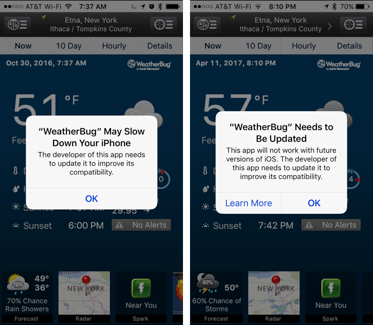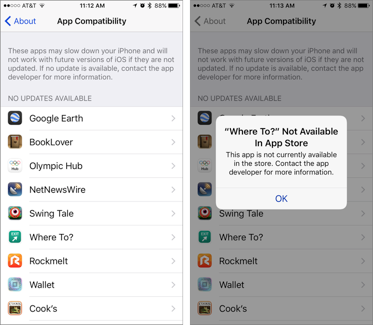Apps on iOS 11: Say goodbye to your little friends
07/23/17 Filed in: iOS
Apple® promises that iOS 11 will set a new standard for the world’s most advanced mobile operating system when it is introduced this fall. It further promises, with iOS 11, that iPhone® and iPad® will be devices that are more powerful, personal and intelligent than ever before.
With the release of the public beta, however, it appears some of the apps you’ve been using on iPhone and iPad won’t launch on iOS 11. Saying goodbye to old friends is tough, but this will help you soften the blow.
Through the iPhone 5, fourth-generation iPad, original iPad mini®, and fifth-generation iPod touch®, Apple used 32-bit processors. However, in 2013, Apple instead began putting 64-bit chips in all new iOS devices. The company encouraged developers to make their apps run in 64-bit mode but kept iOS 7 compatible with older 32-bit apps. Starting in 2015, Apple required apps to run in 64-bit mode to receive App Store® approval. And iOS 10 initially warned that 32-bit apps might slow down your device and later said that 32-bit apps would need to be updated.

In essence, don’t worry about what 32-bit and 64-bit mean — all you need to know is that your 32-bit apps are old and won’t run in iOS 11, and that 64-bit apps will continue to work as they always have. How do you know which of your apps are 32-bit? For apps you regularly use, you’ve probably seen one of those warnings. But for apps you don’t, how do you learn which apps are destined for the chopping block?
In iOS 10.3, Apple added a feature to call out these apps.
• Navigate to Settings > General > About > Applications to see a list of 32-bit apps that don’t have direct updates available (if Applications isn’t tappable, either you still need to upgrade your device to iOS 10.3 or your device doesn’t contain any 32-bit apps).
• Tap an app in the list to load it in the App Store, where you may be able to find more info or a support link for the developer. Unfortunately, many old apps aren’t in the App Store anymore.

Knowing which of your apps won’t survive the iOS 11 transition gives you a few options:
• Delete the app. If you haven’t used an app in years, there’s no reason to keep it around.
• Look for an update that’s now a new app. Because Apple doesn’t let developers charge for updates, many developers have been forced to make their updates into new apps so they can afford future development. Search in the App Store for the app to see if a new version appears, or look for information on the company’s web site.
• Look for an alternative app. Few iOS apps are truly unique, so you may be able to find an alternative that does basically the same thing.
• Don’t upgrade to iOS 11 — or, at least, don’t upgrade right away. In general, you should stay up to date with new versions of iOS to ensure that you’re protected from security vulnerabilities that Apple has discovered and patched. But there’s no harm in delaying an upgrade as you wait for an app to be updated or to find an alternative.
• Stick with an older device. If you have an extra iOS device that can’t run iOS 11 anyway, keep the app on that device.
When iOS 11 lands, its new features and capabilities will make your iPhone and iPad experience more immersive than ever before. By taking a few minutes now to account for your go-to apps that will disappear, you will be well prepared to make the transition.
Need help on any or all of your iOS and macOS devices? CranstonIT is an Apple-centric professional IT services company that provides certified consultants, technicians and developers for IT solutions in Managed Services, On-Demand Projects and Business Application Development. Contact us today at 888-813-5558 or support@cranstonit.com

In essence, don’t worry about what 32-bit and 64-bit mean — all you need to know is that your 32-bit apps are old and won’t run in iOS 11, and that 64-bit apps will continue to work as they always have. How do you know which of your apps are 32-bit? For apps you regularly use, you’ve probably seen one of those warnings. But for apps you don’t, how do you learn which apps are destined for the chopping block?
In iOS 10.3, Apple added a feature to call out these apps.
• Navigate to Settings > General > About > Applications to see a list of 32-bit apps that don’t have direct updates available (if Applications isn’t tappable, either you still need to upgrade your device to iOS 10.3 or your device doesn’t contain any 32-bit apps).
• Tap an app in the list to load it in the App Store, where you may be able to find more info or a support link for the developer. Unfortunately, many old apps aren’t in the App Store anymore.

Knowing which of your apps won’t survive the iOS 11 transition gives you a few options:
• Delete the app. If you haven’t used an app in years, there’s no reason to keep it around.
• Look for an update that’s now a new app. Because Apple doesn’t let developers charge for updates, many developers have been forced to make their updates into new apps so they can afford future development. Search in the App Store for the app to see if a new version appears, or look for information on the company’s web site.
• Look for an alternative app. Few iOS apps are truly unique, so you may be able to find an alternative that does basically the same thing.
• Don’t upgrade to iOS 11 — or, at least, don’t upgrade right away. In general, you should stay up to date with new versions of iOS to ensure that you’re protected from security vulnerabilities that Apple has discovered and patched. But there’s no harm in delaying an upgrade as you wait for an app to be updated or to find an alternative.
• Stick with an older device. If you have an extra iOS device that can’t run iOS 11 anyway, keep the app on that device.
When iOS 11 lands, its new features and capabilities will make your iPhone and iPad experience more immersive than ever before. By taking a few minutes now to account for your go-to apps that will disappear, you will be well prepared to make the transition.
Need help on any or all of your iOS and macOS devices? CranstonIT is an Apple-centric professional IT services company that provides certified consultants, technicians and developers for IT solutions in Managed Services, On-Demand Projects and Business Application Development. Contact us today at 888-813-5558 or support@cranstonit.com

